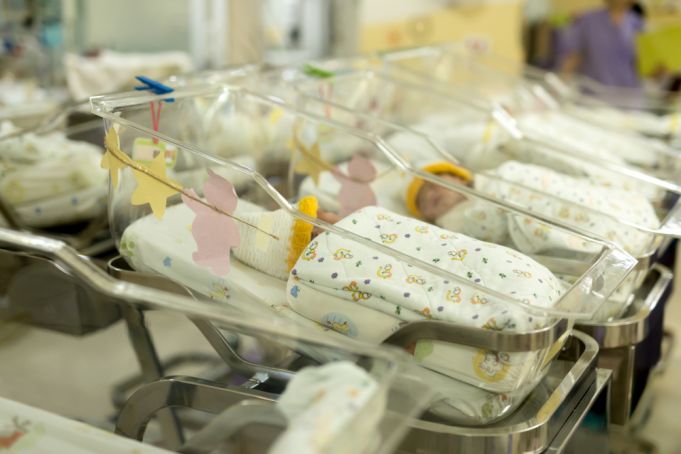Pregnancy in Rome in the covid-19 era
The personal account of expecting a baby and becoming a mother during the coronavirus emergency in Rome.
By Theresa Potenza
Everyone has that one defining moment. That day or event when the weight and reality of the pandemic comes crashing down on them. It could be the day that all museums or schools closed. Or when there was a flour shortage in the supermarket. One of the most exciting but daunting moments for some could be, a positive pregnancy test. Or even, a positive covid test. During the pandemic, I experienced both.
In November, we were eight months into the pandemic and I was 34 weeks pregnant. I fell asleep in the car as I parked before unloading the groceries. That evening while cooking dinner, cutting an onion, I realised I had lost my smell. I put the onion close up to my nose and tried desperately to get my olfactory working with anything I could find in the house... perfume, soaps, onions, garlic... nothing. That’s when I knew, I wasn’t just tired. I had covid. Despite not going to work and isolating myself from friends at a time when I needed them the most, with a weakened immune system due to pregnancy, I got the virus.
The next 24 hours, as my energy levels weakened and my taste and smell disappeared, my mind raced with so many questions. The primary concern: where could I get prenatal care being covid positive, and since I was close to my due date, where can I deliver my baby?
A string of phone calls led to the conclusion that in Lazio there are two hospitals that have a covid maternity centre: Policinico Gemelli and Policlinico Umberto 1. These hospitals are evolving daily to meet the needs of pregnant women with the coronavirus. I had planned my delivery at a different hospital but now my labour was taking an unexpected and unfamiliar turn.
My husband dropped me off outside the maternity ward of Ospedale Gemelli where I subsequently waited in a makeshift tent with cement flooring, canvas walls and a portaloo, in the car park while a team of nurses came out in hazmat gear over a span of 12 hours to provide a series of covid tests, blood tests and sonograms.

I arrived at noon and a room in a special ward in the hospital finally opened up for me at midnight. After sitting in a plastic chair in the November cold in the parking lot of the hospital for half a day, I was never so happy to be in a hospital bed. A place designed specifically to care for someone like me, a designated covid maternity centre.
A wide range of emotions swept through me during my stay. On one side, overwhelming isolation caused by language barriers and physical barriers with all the doctors and nurses in hazmat gear. Through all the gear, I couldn’t hear or recognise any care-giver or doctor that I had met. There was no distinction between the cleaning staff and the medical staff so I mistakenly often asked the cleaner about the results of my last medical exam, or the doctor if she could provide more toilet paper in the bathroom. I felt not only alone and apart from any single person in my support circle, but apart from a recognisable face. Did I meet this doctor yesterday or do I have to reintroduce myself and my concerns?
Despite all that, I felt incredible gratitude. At Gemelli they were thorough with my care and did not release me for five days while they continued to run tests for mine and the baby’s safety. They even sent me home free of charge in an ambulance since I was covid positive and nobody could pick me up and I couldn’t take a taxi.
After being discharged, for the next three weeks, my husband and daughter and I isolated ourselves at home. The hospital, after all their thorough tests, told me just to call them if I didn’t feel the baby moving. Otherwise to come back in three weeks when I’d be full term and hopefully negative from the virus. Every day for three weeks, I thought to myself, is today going to be the day that I take a turn for the worse? Am I going to survive? Is my baby going to survive?
Three weeks later, I went back to Gemelli Hospital, tested negative for covid and delivered a healthy boy. Gemelli offers the opportunity for husbands to attend labour, but since I was negative and he was positive, I did it alone. The alone factor would have been more tolerable if the pain factor could have been mitigated.
One important detail was that on the day of delivery, an epidural was not available to me. An appointment with an anesthesiologist is required in advance to have an epidural during labour. At Gemelli, since it is a busy hospital, these appointments need to be booked at least six weeks in advance. Therefore, I suggest that any expecting mother have a back-up plan and book your anesthesiologist appointment not only at the hospital or clinic where you plan to deliver, but also at one of the covid maternity hospitals aforementioned just in case you have the misfortune of being in that situation.
I was given another covid test during delivery and put in isolation with the baby until I received a second negative covid result so they knew safely where to put us. I still wasn’t allowed visitors nor my husband, but after 24 hours I could finally be visited by doctors, and leave the confines of my hospital room, if only to go to the anagrafe to register the baby’s birth.
Looking back, it was a powerful experience. At a time when it seemed all my power had been taken from me, and when so many people were dying, I did a powerful thing in providing life, thanks also to the medical care available to me.

Useful information for expectant mothers in Rome
More advancements at Gemelli include the opportunity for pregnant women that are covid positive to get a sonogram at a reserved time on Saturday mornings. For information tel. 3425049023.
In addition to the medical care I experienced at Ospedale Gemelli, there are many resources available for extra support through Bellies Abroad, a non-profit company designed to help international families have a safe and positive birth experience, all more necessary in the time of a global health crisis. The website provides assistance in English for pregnancy, postnatal care and parenting, including a list of service providers.
You can book an online consultation with its founder, 'Mombassador' Kiersten Pilar Miller, for information on any of the multitude of questions you may have about pregnancy and delivery during this challenging and changing time. She can assist with how to find the most up-to-date information, including legislation regarding maternity care and delivery in Rome hospitals as it relates to covid, suggest various support networks, and help plan a home birth.
Along with a midwife, she leads a weekly online birth course in English that serves as a guided tour for giving birth in Rome with information about Roman hospitals, home birth, how to care for your newborn and education about labour and delivery. The course runs on Wednesday evenings and is pay by suggested donation. Also, post-birth courses on topics such as pelvic floor, baby wearing (slings), and working and pumping are available.
The website also allows you to choose from and book an appointment with a plethora of multilingual, culturally sensitive service providers available for telemedicine, such as midwives, gynecologists, counsellors, family psychologists and pediatricians. Some of the service providers on the website who have already been vaccinated are also available for necessary at-home visits for covid positive patients struggling to find the right care at a critical time in their pregnancies, such as at-home blood tests or vaginal exams. There is also a vaccine research specialist on the team who will be hosting a vaccine questions webinar and is available for individual consultations. The website also provides helpful information regarding doulas and home birth, an ever increasing choice nowadays during a global health emergency.
For assistance and support with breastfeeding, check out your local La Leche League for information about virtual meetings and private consultations, also available in English.
For mothers interested in donating breast milk, you can find information in English on the Bellies Abroad website. The donation process involves contacting the Banca del Latte Umano Donato at Ospedale Pediatrico del Bambino Gesu where you will be given a blood test and questionnaire about your lifestyle habits before donating. See website.
For financial support, the Italian state offers a few bonuses for new mothers. Check with your local CAF (Centro di Assistenza Fiscale) office for information about the Bonus Mamma, Bonus Bebè, and Bonus Asilo Nido. Finally, for information about transportation and getting to medical appointments and hospitals safely, check out My Safe Taxi at www.mysafetaxi.it.
This article was published in the online April edition of Wanted in Rome magazine.


















